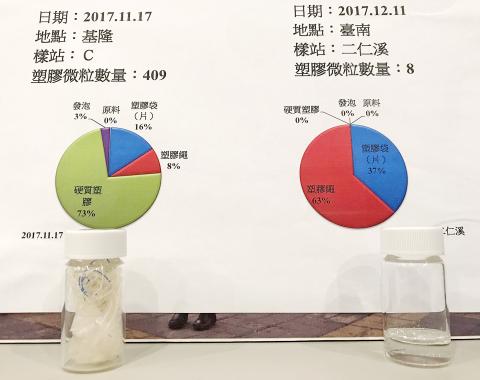The Environmental Protection Administration (EPA) is to research plastic pollution in drinking water and seafood, an EPA official said yesterday, as a response to Greenpeace Taiwan’s call for more monitoring of marine pollution.
Greenpeace Taiwan in November last year and last month held ocean clean-up days in Keelung, Tainan, Kaohsiung and Pingtung County and yesterday revealed its findings at a news conference in Taipei.
In Keelung it collected between 86 and 409 pieces of microplastics — plastic trash that is less than 5mm long — and between two and 39 pieces of trash in different areas off the coast of southern Taiwan, said Hiin Studio deputy executive officer Kuo Fu (郭芙), who collaborated with Greenpeace Taiwan’s project.

Photo: CNA
Microplastics and hard plastics are the most commonly found garbage in Taiwan’s marine areas, she said, adding that the debris often attaches to plankton and microorganisms that have similar weights and volumes.
Microplastics also jeopardize the entire food chain, but research into marine pollution is lacking in Taiwan, Greenpeace Taiwan ocean campaigner Yen Ning (顏寧) said, calling on the government to launch more research on plastic pollution.
The EPA’s Environmental Analysis Laboratory is this year to begin monitoring microplastics in drinking water and farmed fish, laboratory director Yen Chun-lan (顏春蘭) said.
The laboratory is to test 89 water purification plants nationwide for microplastics in the nation’s drinking water, the laboratory’s section chief Yang Hsi-nan (楊喜男) said.
To test the level of plastic pollution in seafood, samples of water, sand and certain farmed fish are to be taken from Changhua County’s Wanggong Village (王功), Yunlin County’s Taisi Township (台西), Chiayi County’s Dongshih Township (東石), Tainan’s Anping District (安平), Penghu County and Matsu (馬祖), he said, adding that they would submit the reports to the EPA at the end of the year.
In July last year, the EPA, Greenpeace Taiwan and other environmental groups formed an ocean waste management platform.
The group has met at least once a month, Yen Ning said, adding that they would unveil new plans on how to tackle marine pollution later this month.
The plan aims to reduce plastics at the source, enact prevention and clean up measures in marine environments, research and monitor marine pollution and enhance public engagement in such efforts, she said.

Taiwan is to commence mass production of the Tien Kung (天弓, “Sky Bow”) III, IV and V missiles by the second quarter of this year if the legislature approves the government’s NT$1.25 trillion (US$39.78 billion) special defense budget, an official said yesterday. Commenting on condition of anonymity, a defense official with knowledge of the matter said that the advanced systems are expected to provide crucial capabilities against ballistic and cruise missiles for the proposed “T-Dome,” an advanced, multi-layered air defense network. The Tien Kung III is an air defense missile with a maximum interception altitude of 35km. The Tien Kung IV and V

The disruption of 941 flights in and out of Taiwan due to China’s large-scale military exercises was no accident, but rather the result of a “quasi-blockade” used to simulate creating the air and sea routes needed for an amphibious landing, a military expert said. The disruptions occurred on Tuesday and lasted about 10 hours as China conducted live-fire drills in the Taiwan Strait. The Civil Aviation Administration (CAA) said the exercises affected 857 international flights and 84 domestic flights, affecting more than 100,000 travelers. Su Tzu-yun (蘇紫雲), a research fellow at the government-sponsored Institute for National Defense and Security Research, said the air

Taiwan lacks effective and cost-efficient armaments to intercept rockets, making the planned “T-Dome” interception system necessary, two experts said on Tuesday. The concerns were raised after China’s military fired two waves of rockets during live-fire drills around Taiwan on Tuesday, part of two-day exercises code-named “Justice Mission 2025.” The first wave involved 17 rockets launched at 9am from Pingtan in China’s Fujian Province, according to Lieutenant General Hsieh Jih-sheng (謝日升) of the Office of the Deputy Chief of the General Staff for Intelligence at the Ministry of National Defense. Those rockets landed 70 nautical miles (129.6km) northeast of Keelung without flying over Taiwan,

City buses in Taipei and New Taipei City, as well as the Taipei MRT, would on Saturday begin accepting QR code payments from five electronic payment providers, the Taipei Department of Transportation said yesterday. The new option would allow passengers to use the “transportation QR code” feature from EasyWallet, iPass Money, iCash Pay, Jkopay or PXPay Plus. Passengers should open their preferred electronic payment app, select the “transportation code” — not the regular payment code — unlock it, and scan the code at ticket readers or gates, General Planning Division Director-General Liu Kuo-chu (劉國著) said. People should move through the